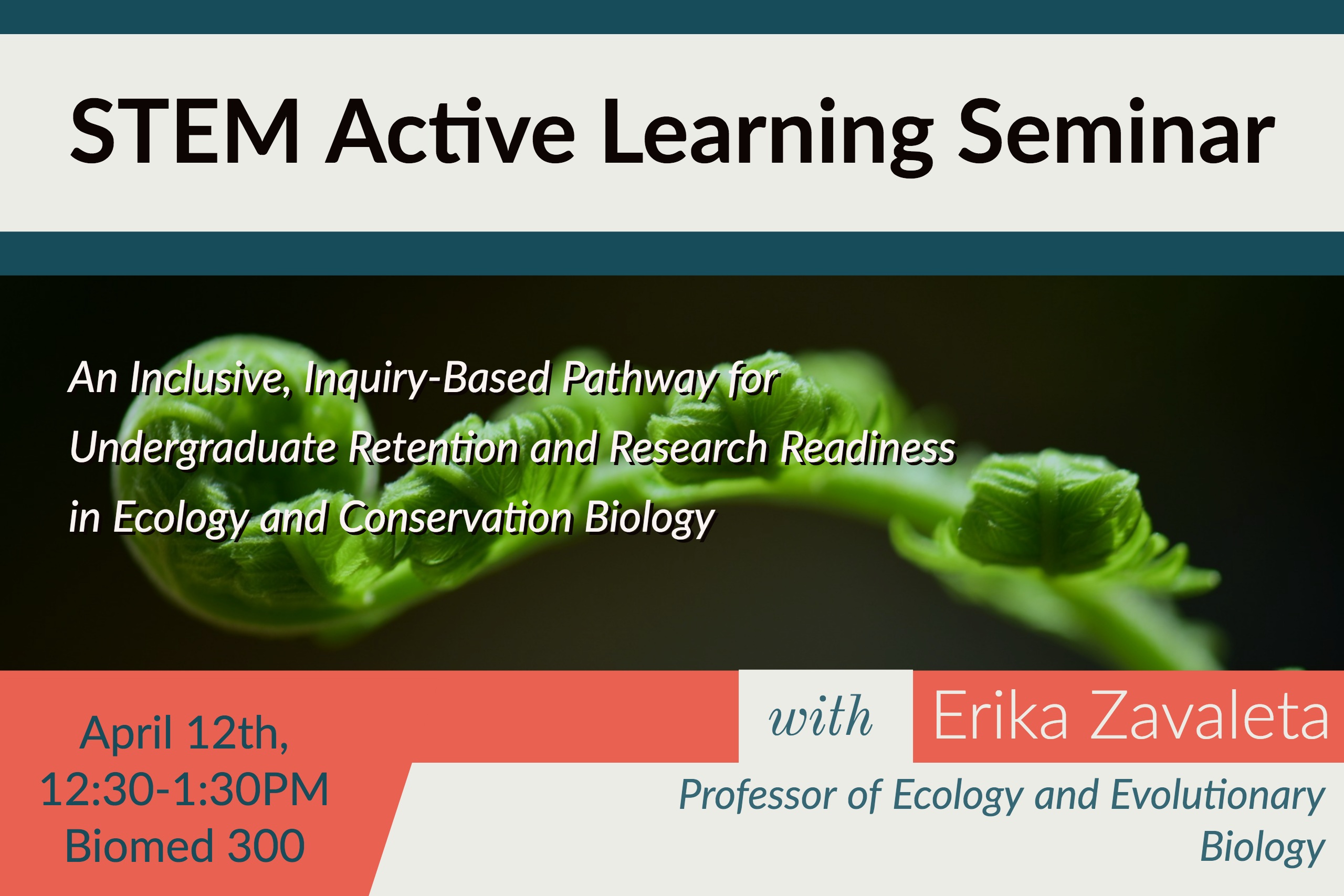An Inclusive, Inquiry-Based Pathway for Undergraduate Retention and Research Readiness in Ecology and Conservation Biology
|
Speaker: Erika Zavaleta, Professor of Ecology and Evolutionary Biology Thursday, April 12th 12:30-1:30pm, Location: Biomed 300, UCSC |
 |
Description: To expand the relevance and effectiveness of ecology and conservation, we need a diverse next generation of leaders. The Center to Advance Mentored, INquiry-based Opportunities (CAMINO) in Ecology and Conservation creates a freshman-to- senior pathway that sustains students through courses, research experiences, professional development, placement, while building a cohesive culture and community of inclusion at the University of California-Santa Cruz (UCSC). UCSC is a Hispanic-Serving Institution with a statewide network of research reserves in a region of globally significant biodiversity. It is thus uniquely positioned to address low diversity, high student attrition, and relatively scarce undergraduate research opportunities in ecology and conservation.
Inquiry-based, inclusive field research experiences can increase participation and propel excellence by undergraduates in ecology and conservation. While most inquiry-based courses emphasize prescribed research experiences, our teaching emphasizes collaborative, field-based engagement in the start-to- finish process of scientific research – from generating the research question and study design to communicating findings. By supporting students to struggle with the entire process, they experience ownership and creative leadership that can be transformative. A well-structured field research course also creates shared experiences and relationships that sustain students who may otherwise feel disconnected in ecology from their backgrounds and previous experiences. Surmountable barriers—like cost, schedules, information, specialized equipment, and a lack of role models on staff— can limit participation by students from diverse and underrepresented backgrounds. By overcoming these barriers, we can enable diverse students to pursue these experiences and help them propel cultural as well as scientific innovation in our field.
CAMINO links and expands inclusive, inquiry-based courses and summer research internships to equip undergraduates to pursue graduate school and successful careers in ecology and conservation. It connects freshman and transfer introductory field courses with upper-division, intensive field research courses that prepare students for successful internship and thesis projects by giving them multiple, short opportunities to design, conduct and communicate research. Summer internships then allow students to engage more deeply in ongoing efforts to understand and manage the effects of environmental changes on populations, communities and ecosystems. CAMINO lowers barriers to involvement in these opportunities through course and internship scholarships. CAMINO also builds capacity in inclusive, inquiry-based field ecology teaching through funded opportunities for graduate students and faculty at UCSC and other universities to mentor interns, co-teach with experienced instructors, and ultimately develop new courses. Mentoring, professional workshops, social events, opportunities for leadership, and an annual research symposium link UCSC students with nationwide participants in UCSC’s Doris Duke Conservation Scholars Program to build an enduring community of practice and network of support.
To understand what works, we study the separate and cumulative influences of CAMINO courses, internships and community engagement on participating undergraduates’ major selection and retention, post-graduation trajectories, and sense of belonging, identity, ownership and efficacy in the fields of ecology and conservation. We communicate our approach and outcomes through conference and public talks, web and print publications, and our network of partners working to expand inclusive field research opportunities in ecology and conservation.
About Erika: Erika Zavaleta is a professor in the Ecology and Evolutionary Biology Department at the University of California at Santa Cruz. She and her research group study the drivers and consequences of changing biological diversity and the role of ecology in guiding effective conservation practice. Recent and current projects address the effects of climate variability and change on endemic California oak populations; the 150-year reconstruction of cumulative nitrogen pollution effects on remnant grassland ecosystems; the effects of climate-driven species losses on serpentine grassland functioning; the need for climate adaptation planning processes, particularly for the state of California; and the global case for ecosystem-based climate adaptation as an alternative to hard-engineered approaches. In most of her work, Erika strives to bridge ecological theory, training and research to sound conservation and management practice. To that end, her research incorporates collaboration with conservation practitioners and elements of economics, public policy, and anthropology. From 2001-2003, Erika was a David H. Smith Conservation Research Fellow of the Nature Conservancy. In 2004-05 she spent a one-year leave working in the philanthropic sector as program ecologist for The Christensen Fund.
Erika completed a BA and MA in Anthropology (1995) and a PhD in Biological Sciences (2001) at Stanford University. She was a recipient of the Ecological Society of America’s Sustainability Science Award in 2008 and has authored or co-authored ~75 papers and book chapters in ecology and social science. Most recently, she co-edited the book Ecosystems of California. She lives in Santa Cruz and enjoys life outdoors with her husband and wee ones (ages 23, 12, 8, and 5).

